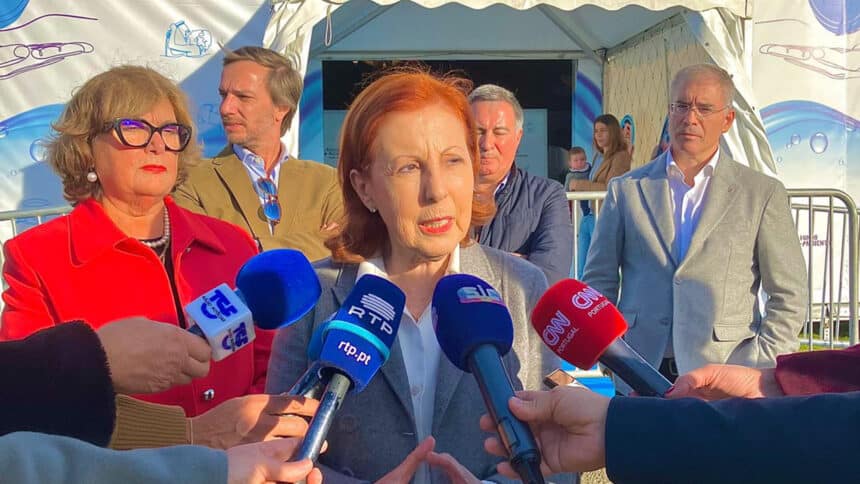Environment minister reveals new plans to protect Algarve from water scarcity
The government is studying a water highway from Alqueva reservoir to the Alentejo and Algarve.
The plan was revealed today by environment minister Maria Graça Carvalho when she visited Faro to launch the public tender process for water abstraction from the Guadiana, at Pomarão.
She explained that water would be channelled first to the Mira Basin (ie the Santa Clara Dam – one that has suffered so massively from the demands of agricultural explorations on the west coast), and then on to Barragem da Bravura, north of Lagos (another dam that has been perilously low for years).
The plan is possible, she added, thanks to Spain’s authorisation for Portugal to use up to 60 cubic hectometers from the River Guadiana.
“As long as the ecological flows of the River Guadiana are guaranteed, 30 cubic hectometres can be used to take water from Pomarão and 30 cubic hectometres to reinforce Alqueva. So, through this reinforcement of Alqueva, it will be possible, and this is what we are studying at the moment, to connect Alqueva to the Mira Basin, therefore to Santa Clara, and from Santa Clara to the Bravura Dam”, she said.
The plan would “give the Algarve greater water resilience”.
There are equally plans for an integrated intervention in the rivers and streams of Baixo Alentejo and the Algarve – with funding from the Regional Operational Programme, to the value of €40 million – through the creation of two river reserves, one on the Vascão River, in the eastern Algarve, one of the tributaries of the Guadiana, and the other on the Odeceixe Stream, in the western Algarve.
“These will be two very important river reserves for our country”, stressed the minister, adding that, due to rainfall, the ‘dire situation’ in Algarve six reservoirs has improved by 40 cubic hectometres when compared to this time last year. They currently have 154 cubic hectometres of water stored, whereas “last year we had around 114 cubic hectometres”.
Ms Carvalho also referred to the fact that the government is “negotiating an increase in funding for works carried out by municipalities, so that they do more to reduce water losses”.
In total, “the funding we’re doing in the Algarve amounts to close to €500 million” – and she is sure that the result will be a region “better prepared to face the challenges of the future”.
New dams and desalination
Asked by journalists about the possibility of building new dams on the Foupana and Alportel rivers, Maria da Graça Carvalho said answers would come in the first quarter of 2025.
“We have a group, the Q1 Water Group, which was announced by the Prime Minister when we started this government, chaired by the president of Águas de Portugal (Carmona Rodrigues), and which is finalising its work to present to the government. Our political priorities are, firstly, to save; secondly, to reuse; thirdly, to avoid losses; fourthly, to use existing infrastructures, optimise them and increase their size, if possible. And only as a last resort, to do new work. We will see what the results are very soon, at the beginning of the year”.
As for the future desalination plant in the Algarve, planned for Albufeira, the minister “refuted scepticism”, say reports. Overall, “the desalination plant will produce around 24 cubic hectometres of water, and the connection to Pomarão, 30 cubic hectometres. Human consumption is around 75 cubic hectometres. Today, the Algarve is in a situation where there is less and less rainfall, a trend of the last 20 years. It is a whole desertification front that is moving northwards into Europe. Today, Malta survives on a desalination plant and the reuse of water, it has no other source. At the moment there is funding that may not exist in the future. My mission is to get the Algarve ready”, the minister insisted.
Graça Carvalho also recalled that Spain, by comparison, “has more than 700 desalination plants. Cape Verde has eight and is building its ninth. It had its first in the 1950s in Mindelo, built during Salazar’s time. Technologies have evolved a lot and we can’t waste any more time discussing’ desalination in the Algarve region.
“The Algarve has very serious problems, it needs a lot of water for agriculture, tourism and human consumption. We can’t let it become arid because that would be very bad for the economy and for quality of life. The Algarve is a marvellous region, but it needs water to be a marvellous region”.
Source material: LUSA/ SIC


























